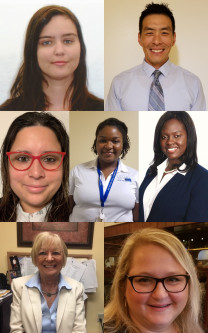RISE Project Partner Profile: Legal Aid Service of Broward County, Inc. (Florida)
A core aspect of the RISE Project is NCVLI subgranting to six direct service providers to provide legal representation to assist victims in asserting and seeking enforcement of their rights in criminal cases, and, as necessary during and in support of such representation, provide those victims representation on collateral civil legal matters arising from the victimization. Following a competitive selection process, six were selected. Legal Aid Service of Broward County, Inc. is one of them.
What is the mission of your agency, and how does the RISE Project fit within that?
Legal Aid Service of Broward County, Inc. (LAS) and its project partner Coast to Coast Legal Aid of South Florida (CCLA) are 501(c) (3) nonprofit organizations. Their missions are to provide high quality free civil legal services to the economically disadvantaged population in Broward County, to improve their living conditions, and to encourage self-sufficiency. Under the RISE Project, LAS and CCLA provide victims of crime in Broward County, Florida with access to legal representation to assert and seek enforcement of their rights in criminal cases. The assertion of these rights is pursuant to Section 16, Article 1 of the Florida Constitution which was enacted on January 8, 2019 and is also known as “Florida’s Marsy’s Law”. All victims served under the RISE Project have the benefit of working with a trauma-informed social worker who may assist victims with crisis intervention and accompaniment, and who provides community resources and warm referrals to other agencies and organizations.
When and how did you first start working with NCVLI?
In 2019, NCVLI, with funding from the Office of Victims of Crime, executed a subgrant with LAS to represent victims of crime to assert their civil rights in criminal court proceedings. NCVLI provides the technical assistance under this grant and has been instrumental in leading us forward with their best practices and strategies to assert and enforce these rights on behalf of victims of crime.
Tell us about a recent success/deliverable of your RISE Clinic.
The RISE Project is the first of its kind in Florida under the new Constitutional Amendment. LAS and CCLA are making small strides in enforcing victims’ rights, one case at a time. Our RISE attorneys have been hard at work to protect our clients’ rights at every turn – from drafting powerful victim impact statements to successfully protecting child sexual assault victims by filing motions to oppose the Defendant’s release from jail. RISE attorneys have also been instrumental in helping victims obtain civil restraining orders, thus empowering victims of crime to feel more protected during the criminal justice process.
Why should other individuals, clinics and/or organizations partner with NCVLI?
Notwithstanding small victories, it is clear that rights enforcement is going to be difficult (1). Since the time that Florida’s Marsy’s Law was enacted, there has been push back by Defendants’ attorneys, some State Attorneys, and the courts. In the few state cases that have reached the appellate stage, the court interpreted Florida’s “Marsy’s Law” under a very narrow lens, ignoring the language and spirit of the law, and depriving victims’ rights to participate in the criminal proceedings1
.It is for precisely this reason that all individuals, legal clinics, and legal aid organizations should get involved with victims’ rights enforcement. Without the efforts of all, victims will continue to be ignored in the criminal process, and their constitutional rights will continue to be infringed upon.
What would you most like for the victims’ rights movement to accomplish in the next five years? How does your work to aid in that accomplishment?
LAS and CCLA hope that, in the next five years, the victims’ rights movement in Florida will be able to enforce rights for victims that have been denied by the courts. We will continue to showcase adverse rulings around Florida and the nation. We will identify the issues which are ripe for appeal or writ and create favorable precedent for future victims who are denied rights by the courts. We will continue to challenge rulings in writs and appeals in order to shine a light on the need for strong enforcement of rights.

Learn more about the Rights in Systems Enforced (RISE) Project here.
(1) L.T. vs. State of Florida and J.T, First District Court of Appeals, Case No. 1D 19 3032, April 17, 2020.

